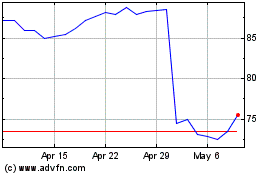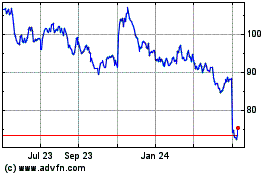By Cara Lombardo and Julie Jargon
William Ackman's activist hedge fund has built a roughly 1.1%
stake in Starbucks Corp., a so-far friendly bet that the coffee
giant will recover from recent stumbles and weather the departure
of its longtime leader, Howard Schultz.
Mr. Ackman unveiled Pershing Square Capital Management LP's
investment in the Seattle coffee company during a presentation
Tuesday at a conference in New York, his first such appearance in
several months. He took the stage with an unsweetened Starbucks ice
tea.
Mr. Ackman said he thinks Starbucks shares have slumped recently
due to a slowdown in same-store sales growth, a reduction in
long-term growth targets and leadership changes. But he predicted
the stock could more than double in price over the next three
years.
The noted activist investor said management appeared to be
taking all the right steps to get the business back on track,
though Pershing Square hasn't yet met with Starbucks
executives.
Mr. Ackman said his fund amassed 15.2 million shares at an
average of $51 a share over the past few months. That means he
already has made a tidy paper profit on the stock, which rose 2.1%
Tuesday to $57.71. Even with that gain, its shares are up less than
1% this year, trailing broader markets.
Mr. Ackman, a famed investor whose firm has suffered three years
of declining performance due to several bad bets, has recently had
success with investments where he didn't employ activist tactics.
He praised Starbucks on Tuesday, but didn't rule out eventually
pressing for changes.
If he does, Mr. Ackman's investment stake could become a big
test for Starbucks Chief Executive Kevin Johnson. Mr. Johnson
became CEO in April 2017 and has been running the company entirely
on his own since late June, when Mr. Schultz, who built the company
into a global chain, stepped down as chairman. Until then, Mr.
Johnson had worked closely with Mr. Schultz, whose office was next
door.
Starbucks said in a statement that it looks forward to
"maintaining a productive dialogue with Mr. Ackman as we do with
all of our shareholders."
The company has been struggling with slowing sales over the past
few years in the U.S., an increasingly competitive market for
coffee.
After some analysts criticized the ubiquity of the brand, the
company in June said it would close 150 U.S. stores in its 2019
fiscal year, triple the number it closed on average in recent
years, and that it would slow the growth of licensed stores in
airports, supermarkets and other retail stores. Starbucks will
still open more stores overall, but at a slower rate of growth in
fiscal 2019.
Those closures will mostly be in urban markets, where Starbucks
stores are tightly clustered and rent and wages are high, Mr.
Johnson said at the time. He added there was still room to build
more Starbucks in the Midwest and South. Mr. Ackman said the same
thing during his presentation. Starbucks has about 14,400 U.S.
stores currently.
Mr. Ackman also noted Starbucks's same-store sales have
consistently been positive and that it is the dominant brand in the
fast-growing coffee category.
"Young people are giving up soda for coffee," he said while
answering questions after his presentation. "Starbucks will be the
biggest beneficiary of that change."
But part of Starbucks's U.S. sales slowdown stems from
consumers' migration to healthier drinks. Sales of its sugary
Frappuccinos, which account for 11% of sales at U.S.
company-operated cafes, fell 3% this year through May. Just three
years ago, Frappuccino sales grew 17%. Starbucks has worked to
reduce the sugar and calorie content of the drinks and is testing
healthier versions in a few states.
The U.S. isn't the only market that has struggled. The company
surprised investors in June when it reported a sudden sales
slowdown in China, a country it had been touting as a high-growth
market. In July, it reported same-store sales in China fell 2% in
its fiscal third quarter as it lowered its global same-store sales
growth outlook. Starbucks has since taken steps to remedy its
troubles there.
Mr. Ackman said he likes Starbucks's long-term growth prospects
in China. "We expect China will grow nearly twice as fast as
Starbucks's overall earnings and represent an increasingly larger
percentage of the company's earnings," he said in his
presentation.
Mr. Johnson's plans for boosting U.S. sales, meanwhile, have
revolved around expanding its "digital relationship" with customers
by opening its mobile-order app to people who aren't in its rewards
program.
In a memo to employees last month, Mr. Johnson hinted at his
concerns when he said the company would restructure, a move that
would include layoffs. "We must knock down the barriers in our
decision-making and provide more clarity on the work that is
important and what is not," he said in the memo, which was reviewed
by The Wall Street Journal.
Mr. Ackman, meanwhile, has cut back on public appearances after
his bad bets, including on Valeant Pharmaceuticals (now known as
Bausch Health Cos.) and against Herbalife Ltd., which spurred
declines and prompted some investors to withdraw. The Journal
reported in April he might face a future that wouldn't include him
managing a private hedge fund.
Pershing Square has recovered somewhat recently, with its public
fund, which closely tracks its private fund, up 15.8% this year
through last month, beating broader markets.
The $8.4 billion Pershing Square -- which became well-known for
high-profile activist campaigns at companies such as J.C. Penney
Co. and General Growth Properties Inc. -- made a quick profit of
about $100 million on Nike Inc. earlier this year without agitating
for change. The fund also has been supportive of management at
Chipotle Mexican Grill Inc., one of its best-performing
holdings.
Write to Cara Lombardo at cara.lombardo@wsj.com and Julie Jargon
at julie.jargon@wsj.com
(END) Dow Jones Newswires
October 09, 2018 19:54 ET (23:54 GMT)
Copyright (c) 2018 Dow Jones & Company, Inc.
Starbucks (NASDAQ:SBUX)
Historical Stock Chart
From Apr 2024 to May 2024

Starbucks (NASDAQ:SBUX)
Historical Stock Chart
From May 2023 to May 2024
